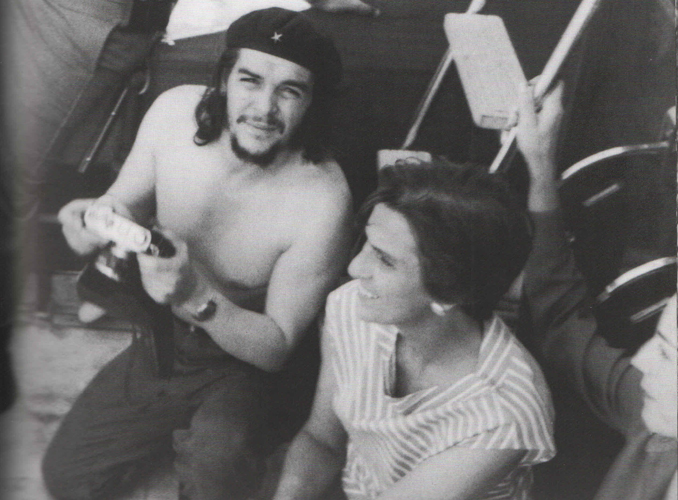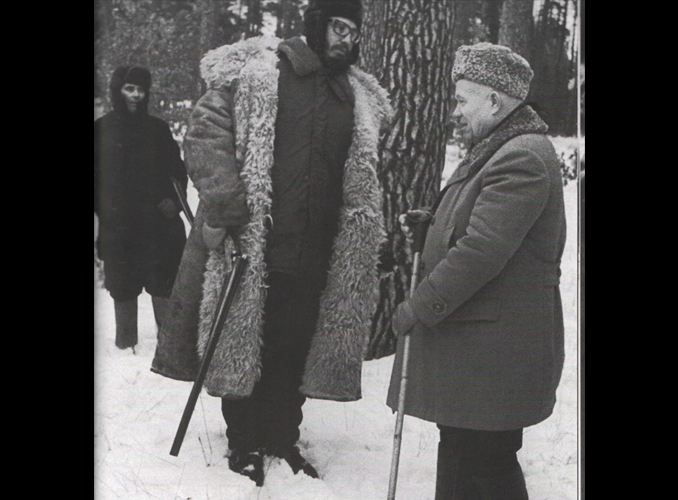Written by: Dr. Dushka H. Saiyid
Posted on: September 6, 2013 |  | 中文
| 中文
'David and Goliath', Fidel Castro at the Lincoln Memorial
The American Monroe Doctrine of 1823 had stated that any attempt by a European power to colonize land in North or South America would be regarded as an act of aggression, and would require intervention by the USA. This kept the European powers out of South America, while the commercial interests of the US increased, as did incidents of American interventions to install pliant governments. By the 1920s, the United Fruit Company was spread all over Central America, and exercised formidable influence over small nations, giving birth to the expression “banana republics”. It was responsible for the invasion of Honduras in 1911, and in a classic case of nexus between the American government and its corporate sector, engineered the invasion of Guatemala and the overthrow of its reformist President Arbenz in 1954. This was done in collaboration with the State Department, headed by John Foster Dulles, and the CIA, headed by Allen Foster Dulles. Both the brothers had served as legal advisors to the United Fruit Company. Ernesto “Che” Guevara was in Guatemala at the time, and was forced to flee with other Arbenz supporters to Mexico. The Guatemalan experience was a turning point in Che’s life, for he wrote to his mother that independence for South America could only be achieved through revolution and not reform, and joined Castro’s band of revolutionaries in Mexico.
 |
| 'Che' Guevara with mother |
Castro’s triumphal procession entered Havana on the 8th of January 1959 to a delirious welcome. The new government introduced a series of social reforms: setting their own salaries to the level of basic wage, reducing prices of meat, medicine, housing, transport, electricity and telephones. But the break from the past came on May 17, when the large latifundias were broken into holdings not larger than 400 hectares, and land was collectivized rather than re-distributed. This measure affected American interests directly, as concerns like the United Fruit Company owned large holdings. But even before this measure, the US National Security Council had met to discuss measures for regime change in Cuba.
Castro accepted an invitation from the American Association of Newspaper Editors. He had come to meet the people rather than the government, and won them over. His meeting with Vice President Nixon was not a great success, but he lunched at the National Press Club and gave an interview on television in the, “Meet the Press”, re-iterating each time that the Platt Amendment (which gave USA the right to intervene militarily in Cuba, whenever it saw fit), inserted into the constitution of Cuba in 1902, was not acceptable.
Cuban-Soviet rapprochement had begun in early 1960, and the US feared that Castro was joining the communist bloc. On March 4, 1960, two explosions blew up the French cargo ship La Coubre, carrying munitions bought by Cuba from Belgium against American opposition. The same month President Eisenhower ordered the CIA to launch a series of anti-Castro operations. Castro feared a repeat in Cuba of the 1954 invasion of mercenaries into Guatemala.
By June 1960 the trade war between Cuba and the US had escalated, and in October the US imposed an embargo on Cuba. The Soviet Union stepped in to buy Cuba’s sugar that had previously been exported to the US. From September 1960 onwards there were a number of assassination attempts on the life of Castro. Even the mafia was contracted for that purpose, for they had lost millions of dollars of business in casinos, hotels, prostitution and drugs as a result of the revolution.
 |
| Fidel Castro with Nikita Khrushchev |
The USA finally broke diplomatic relations with Cuba on January 3, 1961, and on April 15 eight B-26 bombers took off from Nicaragua to bomb Cuban airports and destroy its miniscule air force. Two days later the invasion began with the landing of 1400 trained Cuban emigres at the Bay of Pigs, using some ships supplied by the United Fruit Company. When the Cuban air force sank two cargo ships, which had transported these men, the rest of the ships retreated. Within two days, the invaders were either killed or arrested.
The Soviets warned Castro in 1962 that the US was planning another invasion, and suggested that he deploy defensive strategic weapons in Cuba. While Khrushchev, the Soviet President, denied to Kennedy that they had any plans to deploy strategic weapons in Cuba, a U2 plane photographed a missile base being built. Kennedy announced on October 22, that he was going to put a naval blockade around Cuba. The world waited for the outbreak of a nuclear war with bated breath as the Soviet ships, escorted by submarines, came in contact with the US warships on October 24. At the last minute wisdom prevailed, and Khrushchev ordered the withdrawal of Soviet navy. Two days later he proposed to Kennedy the withdrawal of missiles in exchange for a commitment that the US would not invade Cuba, and would dismantle its missiles in Turkey. The world had escaped an apocalyptic war!
Bay of Pigs and Cuban Missile Crisis (Extracts from the documentary, La Vida del Che)
You may also like: